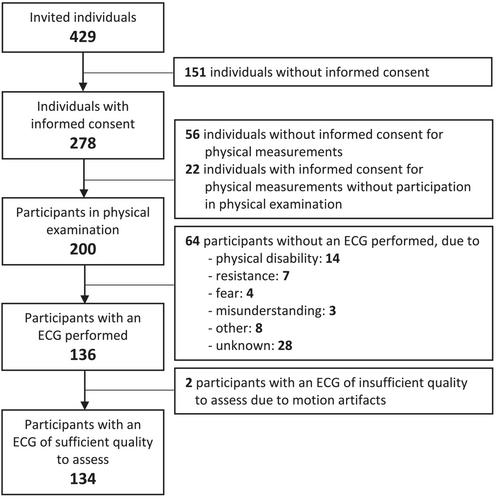Feasibility and findings of electrocardiogram recording in older adults with intellectual disabilities: results of the Healthy Ageing and Intellectual Disabilities study
Abstract
Background
Older adults with intellectual disabilities (ID) have a high risk of cardiovascular diseases (CVD). At the same time, challenging diagnostic work-up increases the likelihood of underdiagnosis of CVD in this population. To limit this underdiagnosis, it would be beneficial to use objective measures such as the electrocardiogram (ECG). However, little is known about the feasibility of ECG recording and the prevalence of ECG abnormalities in this population. Therefore, the aims of this study were to investigate the feasibility of resting ECG recording, to study the prevalence of ECG abnormalities, and to compare the frequency of ECG abnormalities with medical records in older adults with ID.
Method
A cross-sectional study was performed within a cohort of older adults (≥60 years) with ID as part of the Healthy Ageing and Intellectual Disabilities (HA-ID) study. A resting 12-lead ECG was attempted, and the ECG recording was considered feasible if the recording could be made and if the ECG could be interpreted by a cardiologist and the Modular ECG Analysis System (MEANS). ECGs were assessed for the presence of ECG abnormalities and medical record review was performed. If the cardiologist or MEANS concluded that there was evidence of myocardial infarction, atrial fibrillation or QTc prolongation on the ECG in the absence of this ECG diagnosis in the participant's medical record, this was classified as a previously undiagnosed ECG diagnosis.
Results
ECG recording was feasible in 134 of the 200 participants (67.0%). Of these 134 participants (70.6 ± 5.8 years; 52.2% female), 103 (76.9%) had one or more ECG abnormality, with the most prevalent being prolonged P-wave duration (27.6%), QTc prolongation (18.7%), minor T-wave abnormalities (17.9%), first degree atrioventricular block (12.7%) and myocardial infarction (6.7%). Eight out of 9 (88.9%) myocardial infarctions and all cases of (significant) QTc prolongation (100%) were previously undiagnosed.
Conclusions
This study showed that ECG recording is feasible in the majority of older adults with ID and revealed a substantial underdiagnosis of ECG abnormalities. These results stress the importance of ECG recording and warrant further research into the yield of opportunistic ECG screening in older adults with ID.


 求助内容:
求助内容: 应助结果提醒方式:
应助结果提醒方式:


